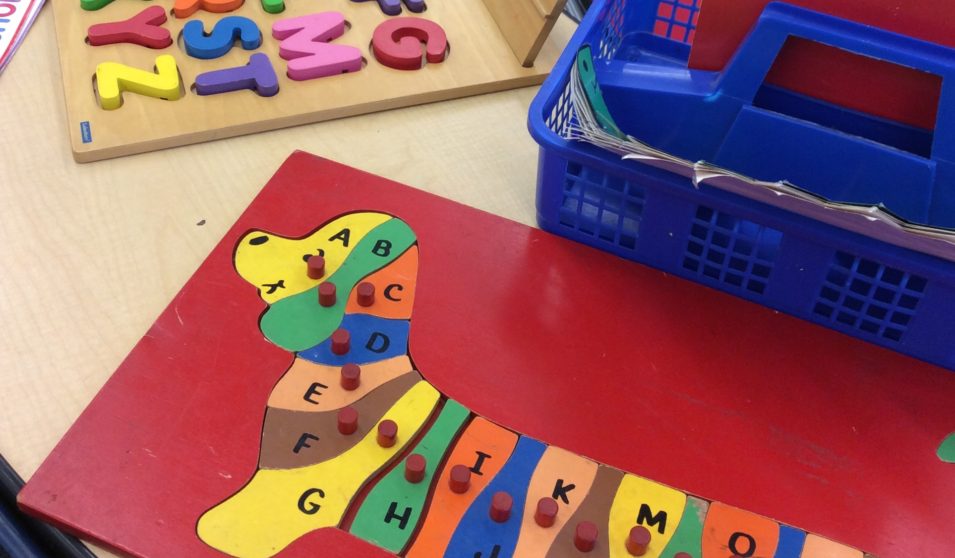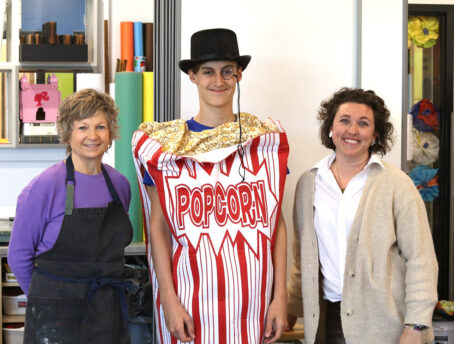Antonio Losavio didn’t grow up in a rural place. But his passion for creating opportunities for rural students and their future teachers stems from a philosophy that education should be a level playing field for all kids -- no matter what their background or where they’re from.
Losavio, a PhD student at the University of Central Florida in Teaching English to Speakers of Other Languages (TESOL), also serves as the department’s service learning coordinator. Losavio is a teaching assistant for TSL 4080: Theories and Practices of Teaching ESOL Students in Schools, a class that helps students build their own personal education philosophy while exploring the theme of “inspiring teaching.” Last spring, Losavio also took on the challenge of coordinating volunteers for a new initiative, a program called Planting Seeds.
Planting Seeds was born out of a collaboration between Dr. Jerry Johnson (head of UCF’s new Institute for the Advancement of Research, Innovation and Practice in Rural Education) and Dr. Joyce Nutta (ESOL and world languages). UCF teacher education students are required to commit to 15 hours of service in local schools, and Planting Seeds specifically places students in rural education settings.
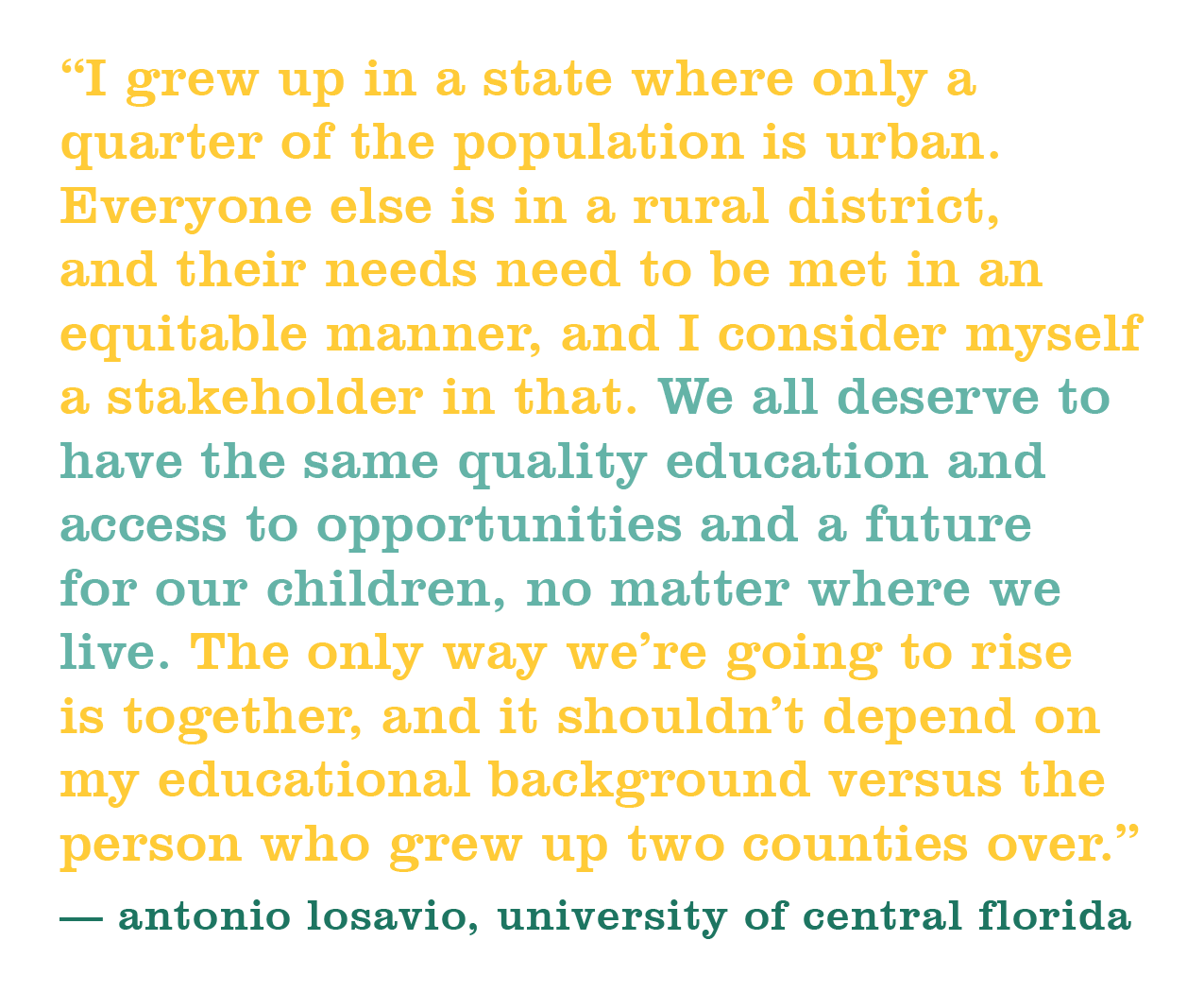
But “rural settings” for students attending college at UCF sometimes meant traveling up to two hours one way to their volunteer sites. The choice to opt for a rural service learning placement was entirely voluntary, said Losavio and his colleague Lauren Raubaugh, but it certainly required more time and commitment than other placements. To encourage pre-service TESOL students to explore the opportunity of volunteering in a rural place, the Planting Seeds program provided each student with an iPad mini, loaded up with instructional games that students could use with kids at their site. Additionally, students were reimbursed for mileage at the end of their semester, and were able to provide each of their teaching sites with over $200 of teaching materials.
The challenges of getting UCF students to rural places were far outweighed by the benefits at the end of the semester, said Losavio. “Some of these rural schools really, in my opinion, were a model of how TESOL should be taught,” he commented. The rural sites that participated in last spring’s pilot Planting Seeds program were chosen because they had high-needs in terms of ESOL, said Losavio. So not only did UCF students benefit from exposure to a new teaching and learning environment, but the project sites, which included a public school, a charter school, and a rural community center, benefitted from the presence of enthusiastic preservice teachers as well.
Of course, getting potential young educators out to rural places isn’t an entirely new idea - but in the case of UCF’s Planting Seeds program, several unique elements stand out. First, many of the students in rural places surrounding Orlando are children of migrant workers living in the area to help with seasonal fruit and vegetable harvests. This means that not only are the student populations in these rural regions highly mobile, they are also heavily comprised of students whose first language is not English. Many of the families are also undocumented immigrants. UCF’s TESOL program is uniquely situated to provide specialized teaching for these regions, a need that Johnson and Nutta specifically identified while writing the grant to fund the pilot year of Planting Seeds.
When Losavio took on the coordination of Planting Seeds, he knew that his students would come away from their rural teaching placements with a whole new perspective -- and he wasn’t sure if it would be positive or negative. But at the end of the semester, after speaking with the program’s inaugural cohort, he was amazed by the collective positive response. “A lot of these students, after spending time in rural districts, started to see them in a different light,” he said. “They noticed that teachers in small towns have different relationships with community. For example, teachers in each district were pulling a lot of different jobs - one was the bus driver for the district as well as as teacher - the flip side is that there’s these close relationships and reliance on each other and the community. The teacher candidates saw this as an advantage over urban districts. School was a central part of the community in these places, and students observed that this affected their perspectives on what inspiring teaching means -- in rural places, it seems, the role of a teacher is so essential and more meaningful. Our students were able to see just how central teachers are in rural kids’ lives.”
For Losavio, this integration between rural schools and their communities was the vital link in changing the perspective of young future teachers. And he thinks that systematically, higher ed needs to have a strong response to the small-town teacher shortage in order to help more pre-service teachers see the advantage of “going rural.”
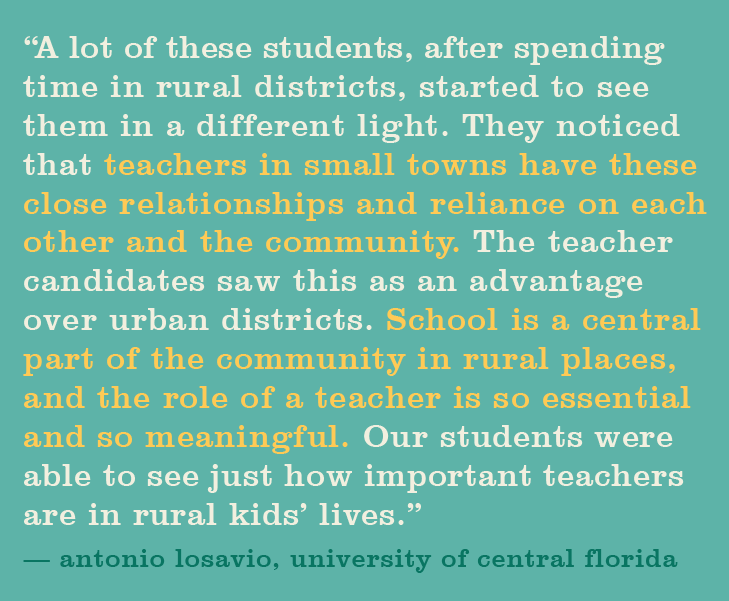
“Long term, for me personally, it’s really important to change the narrative about rural schools and rural life,” he said. “In terms of higher ed, we need to have rural perspectives available in universities in myriad different ways.”
Beyond rural teacher placement programs like Planting Seeds, Losavio would like to see universities host teachers and principals of rural schools as guest speakers and lecturers for students. “The more we do, I hope it gets our students excited about...work in rural schools. It’s a disservice to future educators to not provide access to [the rural] perspective. We need to find a way to expose people to the benefits of teaching in these places.”
For someone who grew up in an urban setting in Louisville, Kentucky, Losavio is a vocal and enthusiastic advocate for strengthening rural education. Despite his upbringing, Losavio says, “I’m invested. This affects my home, my state where I grew up -- it’s one of these issues that needs to be address if the livelihood of people in my greater community is going to be improved. I grew up in a state where only a quarter of the population is urban. Everyone else is in a rural district, and their needs need to be met in an equitable manner, and I consider myself a stakeholder in that. We all deserve to have the same quality education and access to opportunities and a future for our children, no matter where we live. The only way we’re going to rise is together, and it shouldn’t depend on my educational background versus the person who grew up two counties over.”

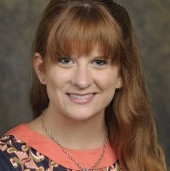

Rural Schools Collaborative would like to thank Dr. Jerry Johnson, Lauren Raubaugh, and Antonio Losavio (above, from L-R) for their collaboration on this interview. Planting Seeds is in the midst of its second semester, and we look forward to bringing you more stories about this innovative program as it continues to grow. Find out more about Planting Seeds, please explore this in-depth article from The Christian Science Monitor.
Learn more about rural teacher recruitment efforts, a major focus of the Rural Schools Collaborative, here.

